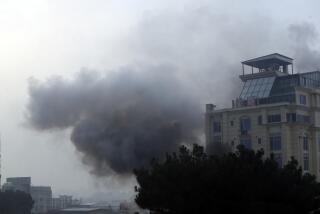Afghanistan suicide bombing leaves six dead
- Share via
KABUL, Afghanistan -- A suicide bomber detonated a Toyota sedan Saturday next to an Afghan army vehicle protecting the site of an upcoming national assembly expected to consider a security pact with the United States. At least six people were killed and 22 wounded.
The explosion tore into the armored military vehicle on a street outside a university campus, where a five-day gathering of prominent Afghans, known as a loya jirga, is to open Thursday. The assailant was killed in addition to six Afghan civilians and security force members, said Sediq Sediqqi, a spokesman for the Afghan Ministry of Interior.
Several shops and vehicles were mangled by the explosion, the first bombing inside the capital city since Oct. 18.
President Hamid Karzai has asked the loya jirga to provide an advisory vote on a bilateral security agreement with the United States that would define the partnership between the countries after international combat troops depart Afghanistan at the end of 2014.
The 3:15 p.m. explosion was an ominous prelude to the loya jirga, to be held in a tent and meeting rooms at Kabul Polytechnic University in western Kabul. Some of the roughly 2,700 Afghan delegates from across the country have already begun arriving in the capital for registration Wednesday.
The blast came hours after Karzai announced a draft of the agreement had been finalized but “differences” remain on several issues that still must be agreed upon by U.S. and Afghan negotiators.
Karzai did not provide any details of the draft, a copy of which is to be given to each delegate.
The gathering will focus on key issues, including legal jurisdiction for remaining U.S. troops accused of crimes, according to Najib Amin, the loya jirga deputy secretary. The issue of legal jurisdiction for remaining American forces scuttled similar security talks between Iraq and the United States in 2011.
Karzai did not describe the language in the draft document regarding legal jurisdiction. The U.S. has insisted that American troops be subject to the U.S., not Afghan, legal system.
Also contentious is Karzai’s demand for specific U.S. security guarantees against cross-border incursions by Pakistan. The U.S. has resisted.
Failure by the U.S. and Afghanistan to agree on a security deal would result in no U.S. military trainers remaining in Afghanistan after 2014 and significant cuts likely to U.S. military and reconstruction aid.
The loya jirga is an advisory body, but such gatherings traditionally play a strong role in national decisions. Karzai has indicated he will not sign the agreement unless the loya jirga approves it; the assembly is packed with his supporters.
Karzai has the final say on the pact, but Afghanistan’s parliament must also approve it.
Earlier Saturday, Karzai issued a plea for Afghans “with positive and negative views” on the loya jirga and security pact to attend, including members of the Taliban. Many Afghans have criticized the assembly as unnecessary and a waste of time and money.
The Taliban have condemned the assembly as a “farce”’ and have threatened to punish any delegates who attend.
There was no immediate claim of responsibility for the bombing, the first in Kabul since two Afghan civilians were killed in a car bomb explosion outside a compound housing international contractors. The Taliban claimed responsibility for the Oct. 18 attack.
[Update: 10:30 a.m. Nov. 16, 2013: The Taliban later claimed responsibility for the bombing. Taliban spokesman, Zabiullah Mujahid, in a statement to reporters, said the bomber’s name was Sayed Kabuli.]
ALSO:
Philippines government defends typhoon response
China to loosen its one-child policy, end labor camps
Remittances to Latin America rebound -- except in Mexico
More to Read
Sign up for Essential California
The most important California stories and recommendations in your inbox every morning.
You may occasionally receive promotional content from the Los Angeles Times.











